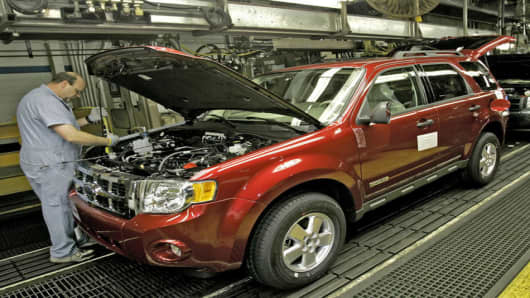"They are still making the same old vehicles - they may look different, but they are not as reliable as the imports. A complete makeover is impossible, but it better come sooner than later." -- Don B., New Mexico
"The Big Threecannot be fixed mainly because of their legacy labor cost structure and perhaps their aging factory infrastructure. Grab one of your nearby B-school grads and ask them if the our car industry is going down the same path as our steel industry. I'll bet it is real analogous. Toyota is going to grab their last bastion of defense, the pickup truck. I wouldn't touch a US auto stock with a 10 foot robot." -- Bill K., Oklahoma
"First and foremost, STOP making gas guzzling Monsters. GM, put the Chevy VOLT into production immediately, millions will be sold. Ford and Chrysler, work on hybrids in all classes, shut some plants and get lean and mean. Where is Iaccoa when you need him? We can do this, one of the greatest things about America is that we can shift gears on a dime. Lets get moving!" -- Steve N. Florida
"Leadership - leadership with courage to increase the speed of change - abandon systems that don’t work – create innovative relationships with suppliers." -- Marty A.
"Well, first of all they have to start making quality vehicles that can run several hundred thousand reliable miles without constantly being in the shop or getting recalled. The Japanese and the Germans are building reliable, quality cars for less that last longer and are better fuel efficient. If I can get a warranty on a vehicle for 7 years/70,000 miles as opposed to one with 3 years/36,000 miles, I will take the former over the latter. BMW's and Toyota's are maintenance free and in BMW's case they even pay for the maintenance. The same cannot be said of Ford or GM. U.S. carmakers have also got to get their costs down and build some vehicles that Americans really want other than Mustangs and Corvettes. The end of cheap oil is here and the designers and engineers in the U.S. are still living in the past. Good luck!" -- Kyle P.
"In my own opinion, they need to start making quality cars that run as well last as long as the foreign automakers." -- Matt K., Illinois
"Stop putting the emphasis on the gas hogs that they are producing and come up with solutions for the consumer." -- Bill J., South Dakota
"They are going to have to pull their heads out of the sand and look to the future instead of their past glories. Building bigger pick up trucks is exactly the backward thinking that has gotten them in the position they are in now. Pay attention to what people are asking for: cleaner running, more fuel efficient vehicles with way higher mileage per gallon, not polluting gas guzzlers that cost a fortune to fill. They have the same attitude of the past captain of his high school football team who doesn't realize he is pudgy, middle aged and has bad knees. Time to pay attention to the changed conditions of now and stopping pretending it is still then." -- Mary S., New York City
"A very dangerous and unpopular act like going open shop (non-union)." -- Irene H., New Jersey
"The problem with the Big Three is that ever since the gas crisis of the 70's their cars have lost quality, reliability, and originality. Just look at the value of an orignal domestic car made before then, now try and convince me that an all-original 2002 Ford Taurus will sell for a huge sum of money 20 or 30 years from now. The Big Three need to stop following Japanese and European automakers and try to regain their self-confidence or they will never stop playing catch-up." -- Mario B., Florida


